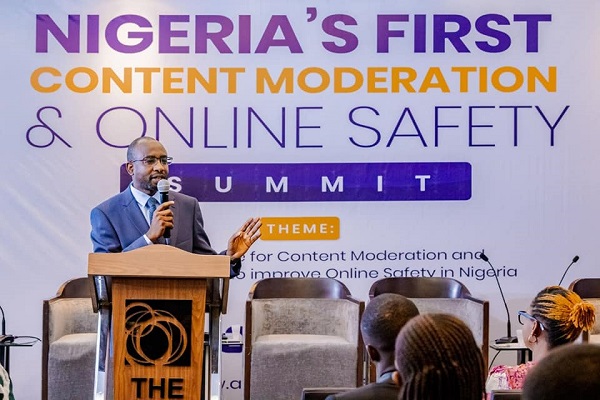
The Minister of Communications and Digital Economy, Prof. Isa Pantami has said the recently released Code of Practice for Interactive Computer Service Platforms/Internet Intermediaries and Conditions for Operating in Nigeria will provide an opportunity to protect the fundamental human rights of Nigerians and non-Nigerians living in the country, as well as defined guidelines for the interacting on digital space.
He made this assertion during Nigeria’s first Content Moderation and Online Safety Summit organised by the Advocacy for Policy and Innovation (API), themed “The Challenge for Content Moderation and the Opportunity to Improve Online Safety in Nigeria” in Abuja recently.
Reiterating the importance of ensuring a safer platform for online users, he referred to Joe Biden’s request to the owner of Facebook for the moderation of misinformation on the platform, as well as Nancy Pelosi’s petitions to the House of Representatives requesting Facebook and Twitter to take-down videos of her ripping the SOTU speech.
Pantami, represented by the director-general, National Information Technology Development (NITDA), Mallam Kashifu Abdullahi mentioned Benjamin Franklin’s response when asked upon his emergence from the Constitutional Convention in Philadelphia in 1787 “’What form of government is the United States going to have?’ Franklin answered succinctly, ‘a Republic if you can keep it’”.
He clarified that Franklin’s response came 70 years before the emergence of the Republican Party “which means that he was referring to the true meaning of the word ‘republic’.
Pantami elaborated that the new democratic republic is not just a new form of government but a government that needs vigilance and, at times, actions to protect and maintain it.
“Today, the social media incidence before the US election indicated that big tech has more power than the government. Users are compelled to obey the big tech’s rules because of the restrictions and sanctions in its usage. For example, if you use Twitter there is a limit of the words you can tweet,” he said.
Pantami emphasised that in a democratic setting citizens should have representatives elected by people to write rules rather than a few. “This causes challenges such as the recruitment system being gender-biased or the recognition system being racist and so on.
“While we need modern software engineers, there is also the need for social engineers to control our social justice. The summit, therefore, is timely and is expected to prompt ways to protecting the ungoverned online space.
“From the period of John Ballos’ declaration in 1996, which explains how he predicted a new cyber world without government, to Eric Smith’s comment that cyberspace is an ungoverned space; to 2018 when Mark Zuckerberg said that the real question is not the need for regulation or not, but what the appropriate regulation is, we need to look at technology as citizens. How [does] it impact our lives? What [should] the big techs control and under what conditions? We believe that today’s technology is central to our social, economic and political lives.”
In his welcome remarks, the director, Advocacy for Policy and Innovation (API), Barr. Kasim Sodangi outlined the harmful ways the internet is affecting people’s lives. “We are at a crossroads due to the abuse of freedom given by the internet. Do we regulate and clamp-down? Do we educate more? What are the tools needed to educate people? How do we properly tackle misinformation and disinformation? These questions leave us to ponder because as a shared resource, the internet is meant to be enhanced and not restricted, so we are left to consider how we can effectively maximise its general usage.”
Similarly, the executive director of Internet Sans Frontiers and the executive director, Content Policy and Society Lab, Stanford University, Julie Owono opined that to have stability for a whole society and safety of online spaces, stakeholders must come together. “The government bodies and agencies must create laws, guidelines, and online content regulations as well as partner with private technology companies, civil society organizations, citizens and academia.”
Owono emphasised that the tech world must not act in silos, but rather in collaboration with relevant stakeholders to be effective.
She stated that the need for transparency remained paramount in online spaces. She cited an example with Twitter’s suspension of Donald Trump’s account due to violence-inciting tweets on American streets. “This form of regulation helps prevent insurgence and protects the safety of the citizens.
She affirmed the need for a governance model to ensure proper review and seamless ‘take-down’ of harmful content on the internet.


